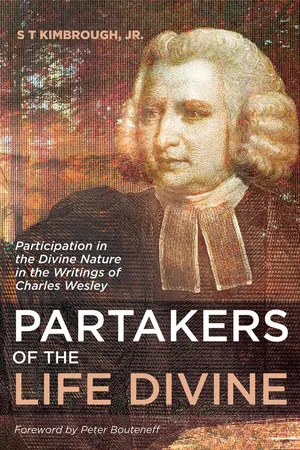
Partakers of the Life Divine
Participation in the Divine Nature in the Writings of Charles Wesley
- 184 pages
- English
- ePUB (mobile friendly)
- Available on iOS & Android
Partakers of the Life Divine
Participation in the Divine Nature in the Writings of Charles Wesley
About This Book
This volume is the first attempt to explore Charles Wesley's understanding of "participation in the divine nature," often described by the church fathers as deification and/or theosis, within the full spectrum of his prose and poetical compositions and in relation to many of the church fathers. While the Eastern Church has been the primary harbinger of the doctrine of deification from the patristic era to the present, Charles Wesley's theology illustrates that this emphasis is by no means absent in the West.Though patristic influences on Charles Wesley's thought are primarily through secondary sources such as the writings of Lancelot Andrewes and Richard Hooker, as well as through the influence of his brother John, this volume underscores prominent resonances with the church fathers. The extent of these resonances in Charles's theology as regards "participation in the divine nature" is so widespread in his writings that they form the matrix of his ideas of salvation, perfection, and holiness, all of which are intimately bound with life lived in and through the Eucharist.If taken seriously, Charles Wesley's ideas on "participation in the divine nature" will require a rethinking of the role of Wesleyan theology in spiritual formation and in ecumenical conversation.
Frequently asked questions
Information
Background: Charles Wesley’s Theology of Mystery
Table of contents
- Foreword
- Abbreviations
- Technical Matters
- Introduction
- Chapter 1: Background: Charles Wesley’s Theology of Mystery
- Chapter 2: Prose Sources: Journal and Sermons
- Chapter 3: The Life Divine and Participation in the Divine Nature
- Chapter 4: The Incarnation and Participation in the Divine Nature
- Chapter 5: The Sacraments and Participation in the Divine Nature
- Chapter 6: The Trinity and Participation in the Divine Nature
- Chapter 7: The Church and Participation in the Divine Nature
- Chapter 8: Divine Love and Participation in the Divine Nature
- Chapter 9: Illumination and Participation in the Divine Nature
- Chapter 10: Transfiguration and Participation in the Divine Nature
- Chapter 11: Sanctification and Participation in the Divine Nature
- Chapter 12: Participation in the Divine Nature as Progression
- Chapter 13: Evaluating Charles Wesley’s Views of Participation in the Light of the Early Church Fathers
- Selected Bibliography